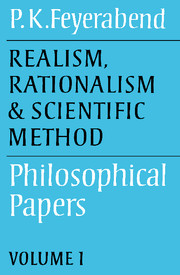Book contents
- Frontmatter
- Contents
- Introduction to volumes 1 and 2
- PART I ON THE INTERPRETATION OF SCIENTIFIC THEORIES
- PART 2 APPLICATIONS AND CRITICISMS
- 8 Introduction: proliferation and realism as methodological principles
- 9 Linguistic arguments and scientific method
- 10 Materialism and the mind–body problem
- 11 Realism and instrumentalism
- 12 A note on the problem of induction
- 13 On the quantum theory of measurement
- 14 Professor Bohm's philosophy of nature
- 15 Reichenbach's interpretation of quantum mechanics
- 16 Niels Bohr's world view
- 17 Hidden variables and the argument of Einstein, Podolsky and Rosen
- Sources
- Name index
- Subject index
8 - Introduction: proliferation and realism as methodological principles
Published online by Cambridge University Press: 05 June 2012
- Frontmatter
- Contents
- Introduction to volumes 1 and 2
- PART I ON THE INTERPRETATION OF SCIENTIFIC THEORIES
- PART 2 APPLICATIONS AND CRITICISMS
- 8 Introduction: proliferation and realism as methodological principles
- 9 Linguistic arguments and scientific method
- 10 Materialism and the mind–body problem
- 11 Realism and instrumentalism
- 12 A note on the problem of induction
- 13 On the quantum theory of measurement
- 14 Professor Bohm's philosophy of nature
- 15 Reichenbach's interpretation of quantum mechanics
- 16 Niels Bohr's world view
- 17 Hidden variables and the argument of Einstein, Podolsky and Rosen
- Sources
- Name index
- Subject index
Summary
Proliferation of views and forms of life was recommended by John Stuart Mill ‘on four different grounds’. First, because a view one may have reason to reject may still be true. ‘To deny this is to assume our own infallibility.’ Secondly, because a problematic view ‘may and very commonly does, contain a portion of truth; and since the general or prevailing opinion on any subject is rarely or never the whole truth, it is only by the collision of adverse opinions that the remainder of the truth has any chance of being supplied’. Thirdly, even a point of view that is wholly true but not contested ‘will … be held in the manner of a prejudice, with little comprehension or feeling of its rational grounds’. And, fourthly, one will not understand its meaning, subscribing to it will become ‘a mere formal confession’ unless a contrast with other opinions shows wherein this meaning consists.
The first two reasons are amply supported by the history of science. We find that ideas are often rejected before they can show their strength. Even in a fair competition one ideology, partly through accident, partly because greater attention is devoted to it, may assemble successes and overtake its rivals. This does not mean that the beaten rivals are without merit and have ceased to be capable of making a contribution to knowledge. It only means that they have temporarily run out of steam. They may return and defeat their defeaters.
- Type
- Chapter
- Information
- Realism, Rationalism and Scientific MethodPhilosophical Papers, pp. 139 - 145Publisher: Cambridge University PressPrint publication year: 1981
- 4
- Cited by



